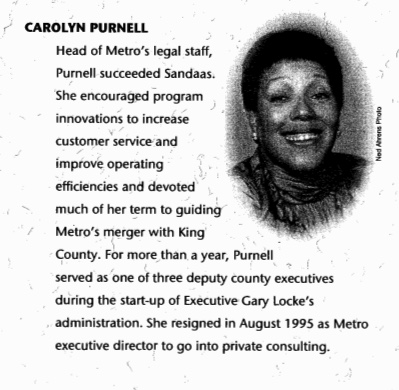Carolyn J. Purnell, a 1971 graduate of the University of Washington’s School of Law, is one of two women who are the first Black women known to have graduated from that institution (Gwendolyn Howard is the other). William McDonald Austin, the first Black man, graduated in 1902 from the University of Washington’s second graduating class. It took almost 70 years for the barrier for African American women law graduates to be broken.
Carolyn Jean Purnell was born in Memphis, Tennessee in 1939 to James and Mardine Purnell who moved their family to Seattle during World War II. She attended the University of Washington to study finance, graduating from the School of Business in 1961. Purnell married, started a family, and worked at the Social Security Administration (SSA). Not finding the work at the SSA particularly gratifying, she concluded she needed a professional credential to pursue a more fulfilling career. Purnell, who had always loved research and writing and found reporting on law-related subjects engaging, decided to study law. In 1968 she entered the University of Washington’s School of Law in a class of 165 students. The class composition was primarily white and male, but the existence of 13 women students was considered a significant advance.
Purnell received her J.D. degree in 1971 and started to look for work. At the time then-Washington Court of Appeals Judge Jerome Ferris advertised he was searching for a law clerk. After an interview, Ferris concluded Purnell needed more experience before fulfilling a clerk position. He arranged for Purnell to interview with Christopher T. Bayley, then King County Prosecutor. Bayley hired her in February 1972 to work for the Civil Division, where Purnell believes she was among the Division’s early women lawyers. Purnell then held various roles in Seattle municipal government, including working as Legal Counsel to Mayor Wes Uhlman. Towards the end of Uhlman’s term, Purnell left government service to join the Weyerhaeuser Corporation as Assistant Legal Counsel in 1977. She eventually became the Director of Corporate Purchasing.
Purnell returned to government in 1993, in King County Executive Gary Locke’s administration as a Deputy County Executive. In that role, Purnell took on the position of Acting Director of Metro Transit, serving as the agency’s final Executive Director as Metro Transit merged and became part of King County government in 1994. Later, Purnell became a management consultant on leadership, team building, mergers and consolidations.
Purnell had two daughters with her first husband, and in 1993, she and Uhlman married. Purnell credits her parents, pioneers in Black community banking in the Pacific Northwest, for inspiration and support: “They encouraged every family member to strive for excellence in education and work, and stood by them all.”
Do you find this information helpful? A small donation would help us keep this available to all. Forego a bottle of soda and donate its cost to us for the information you just learned, and feel good about helping to make it available to everyone.
BlackPast.org is a 501(c)(3) non-profit and our EIN is 26-1625373. Your donation is fully tax-deductible.
“Purnell named Director Corporate Purchasing at the Weyerhaeuser Co,” https://seattletimessubs.newsbank.com/doc/image/v2:[email protected]@[email protected]@?search_terms=;
David Shaeffer, “Locke Seeks Clean Slate – He Asks for Resignations,” The Seattle Times, B1, December 30, 1993, https://seattletimessubs.newsbank.com/doc/news/0EB536EBD5296575?search_terms=’Carolyn+Purnell’+’gary+locke’&pub%5B0%5D=STIW&text=’Carolyn Purnell’ ‘gary locke’&content_added=&date_from=&date_to=&pdate=1993-12-30;
Bob Lane, “Better Than Promised: An Informal History of the Municipality of Metropolitan Seattle,” 1995, https://kingcounty.gov/depts/dnrp/wtd/about/history/better-than-promised.aspx#:~:text=Better%20than%20promised%3A%20an%20informal%20history%20of%20the%20municipality%20of%20metropolitan%20Seattle,-by%20Bob%20Lane&text=As%20a%20Seattle%20Times%20reporter,with%20King%20County%20in%201994.

